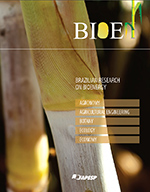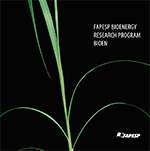Research Innovation
BIOEN, FAPESP Bioenergy Research Program

Versão em português desta página
BIOEN Program web site: http://bioenfapesp.org
The BIOEN, FAPESP Bioenergy Research Program aims at articulating public and private R&D, using academic and industrial laboratories to advance and apply knowledge in fields related to ethanol production in Brazil.
The BIOEN Program includes five divisions:
-
Division of Biomass Research, with focus on sugarcane and including plant improvement and sugarcane farming;
-
Division of Ethanol Industrial Technologies;
-
Division of Bio-refineries Technologies and Alcohol Chemistry;
-
Division of Ethanol Applications for Motor Vehicles: Otto cycle engines and fuel cells; and
-
Division of Research on Impacts: Social and economic, environmental studies, land use, intellectual property.
The BiIOEN Program has a solid core for supporting academic exploratory research related to these topics. It is expected that these exploratory activities will generate new knowledge and form scientists and professionals essential for advancing industry capacity in ethanol related technologies.
On top of this, the BIOEN, FAPESP Bioenergy Research Program establishes partnerships with industry for cooperative R&D activities between industrial laboratories and academic laboratories at universities and research institutes, which are to be co-funded by FAPESP and industry.
For these collaborations the details for each theme are specified agreementing to the interest of the private partners and to FAPESP commitment to fostering research in the State of São Paulo. Other research agencies from federal and other state governments were invited to participate in the BIOEN Program: the Ministry for Science and Technology and Fapemig declared its interest and other agencies are studying their commitment.
Application form for Young Investigator em Emerging Centers: www.fapesp.br/chamadas/bioen/formjp_english.doc
Program folder
 Projetos de pesquisa BIOEN
Projetos de pesquisa BIOEN
Pasta 1: Agronomy, Agricultural Engineering, Botany, Ecology, Economy
Pasta 2: Biophysics, Biochemistry, Genetics, Microbiology, Interdisciplinary
Pasta 3: Food Science and Technology, Engineering, Physics, Geosciences, Mathematics, Chemistry

